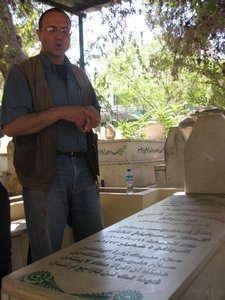Advertisement

 Martyr's Cemetary
Martyr's Cemetary
Prof. Sa'ed at his mother's grave, NablusI don’t know exactly how much everyone out there knows about the history of what are now the occupied Palestinian territories. Whew… let me think about this.
The Palestinian issue is so freaking complex, how to summarize it? …it’s kind of like, well, you know how every Christmas (and this is a universal thing, ha), you excitedly unpack your decorations; only to find your string of lights is now a giant undecipherable ball of tangled mess?
Poor analogy, but that’s kind of you can perceive this conflict. All of us who just finished the workshop are all on this high, but then we realize that we are all going to run into a brick wall. Really, really quickly.
But back on topic. The Israeli-Palestinian issue has a lot of different facets which frustratingly complicate the issue. Here’s a very brief overview:
Palestine was part of the Ottoman Empire, until the end of the WWI, where the colony-happy British happily moved in to civilize the barbarians (which, I actually learned, comes from the word ‘Berber’, a Saharan tribe. Goo racism!)
Then comes the end of WWII. I think we all have a fairly comprehensive idea of that- concentration camps,

 Old City
Old City
Monument to a family- three generations wiped out by an Israeli bulldozer that crushed their house in order to reach the old city. Nablusdiscrimination, and lots, and lots of guilt. A lot of Jews had already made their way back to what was then the British Mandate of Palestine, or, in their words, their Holy Land. In 1948, the colonial powers that formed the UN came together, and decided that 68% of Mandate Palestine became the state of Israel, and the remaining was annexed to Jordan. A popular analogy used by Palestinians: ‘Imagine if someone barges into your house, and immediately takes all the rooms but one. What will your reaction be?’
In the 1967 Six Day War, the Israelis creamed their Arab neighbours, and took over another half of what the Palestinians had, and quite a bit of the surrounding territories (eg the Golan Heights, the Sinai Peninsula).
Since then, the Israeli government has been increasingly encroaching and, for lack of a better word, squeezing the Palestinian population. Checkpoints, curfews, bureaucratic and administrative nightmares in for forms of IDs and licenses are barriers to anything as simple as visiting your family, or crossing over into the other half of your farmland. There are 1 million Palestinian refugees in Gaza, the West Bank, and abroad: only 100,000 remain on their original lands.

 Wadi Kana
Wadi Kana
The pollution of former fresh springs caused by Israeli settlers dumping toxic wastes into the valley(And they grip to the idea of their former lands with a passion). Israeli settlements are expanding on West Bank territory, using up valuable resources (they control most of the water, for example), dumping toxic waste into Palestinian lands, and even attacking the locals (I’ve seen settlers camped out on hills to throw rocks at passing Palestinian cars).
Naturally, these conditions could only be tolerated for so long. The First Palestinian Intifada was a mass uprising from the Palestinian people that resulted in military crackdowns, further arrests, and widespread destruction with little concessions gained. The Second Palestinian Intifada (which I’ve still heard referred to as the current Intifada) was started for similar reasons. Unfortunately, a lot of the time the shacking off of the occupation and oppression leads to justification by Israelis for their human rights abuses, to deal with the Palestinian ‘security threat.’
That is a very brief overview. The issues we dealt with in the workshop dealt with the broad overview, West Bank water issues, the Israeli invasion of Nablus during the 2nd Palestinian Intifada in April 2002, Israeli settler activity, Palestinian Political Prisoners, the Apartheid Wall, and the merits and downfalls of the One State and

 Refugee Camp
Refugee Camp
Showing the complete lack of urban planning by the cramped conditions in Balata refugee campthe Two State solutions.
I think the most significant thing I learned though, amidst all the information crammed in my brain, is that these horrific conditions do not just affect a small percentage of the population. They are far reaching, ubiquitous, with depth and breadth among the Palestinian population. Every single person has at least a relative in jail, every single person knows someone that has been shot, every single person has been humiliated by Israeli soldiers. There is no opportunity to emotionally distance yourself from the problem; you have to reconcile such varying aspects of the population. How could this professor, always smiling and joking, have lost his mother to Israeli gunfire, and has been repeatedly tortured in the interrogation centers? How could this woman still be so sweet after having been locked in her house for 100 days straight during imposed curfews? The Palestinians shake their head and laugh it off, completely and utterly desensitized by Israeli actions- it’s truly the only way to cope.
Advertisement
Tot: 0.123s; Tpl: 0.016s; cc: 6; qc: 44; dbt: 0.0797s; 1; m:domysql w:travelblog (10.17.0.13); sld: 1;
; mem: 1.1mb














